Ahead of Indonesia's Feb 14 elections, OCBC sees 'no clear candidate' to continue Jokowi's policies
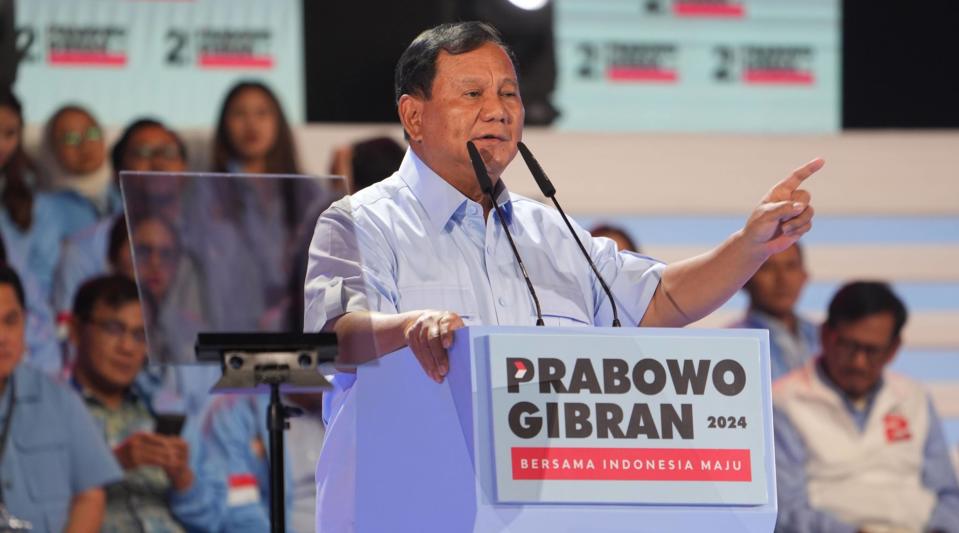
Jokowi has adopted many longer-term priorities that the incoming chief must follow through in order to yield “substantive results”
With Indonesia’s election day on Feb 14, voters are entering the home stretch and the contest is heating up, say analysts from OCBC Global Markets Research.
Recent electability surveys show that the Prabowo Subianto-Gibran Rakabuming pair is gaining traction, say Lavanya Venkateswaran, senior Asean economist; and Ahmad A Enver, Asean economist.
The latest Lembaga Survei Indonesia (LSI) survey on Jan 10-11 suggests that 47% of the electorate will vote for Prabowo-Gibran, write the analysts in a Feb 8 note.
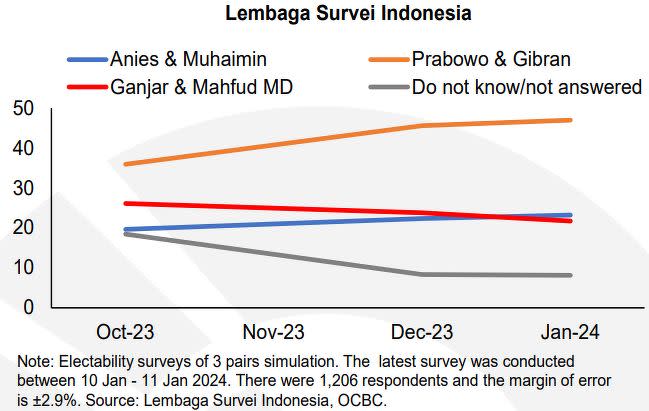
That said, the contest for second place is getting tighter, they add. “The Anies Baswedan-Muhaimin Iskandar pair has overtaken Ganjar Pranowo-Mahfud MD in recent electability surveys, suggesting that if a second-round contest were to take place, Anies looks better for the second place than Ganjar.”
The majority vote is only one of two criteria that a candidate needs to meet. The second criteria is that the candidate pair needs to get 20% of the vote across more than half of Indonesia’s 38 provinces.
There is limited information on this and hence, it remains to be seen if this criterion can be met by any of the three candidate pairs on Feb 14, say the analysts. “The upshot is that the election outcome, first round or second round, remains a close call. In our view, there is still a non-negligible chance of a second round run-off on June 26.”
Releasing the results
Historical precedence suggests that “quick count” results follow later on the election day, say OCBC’s analysts. “These quick counts have proved fairly accurate in past elections, albeit with some institutions more credible than others.”
The formal announcement from the Election Commission (KPU) will follow approximately a month after the elections, they add.
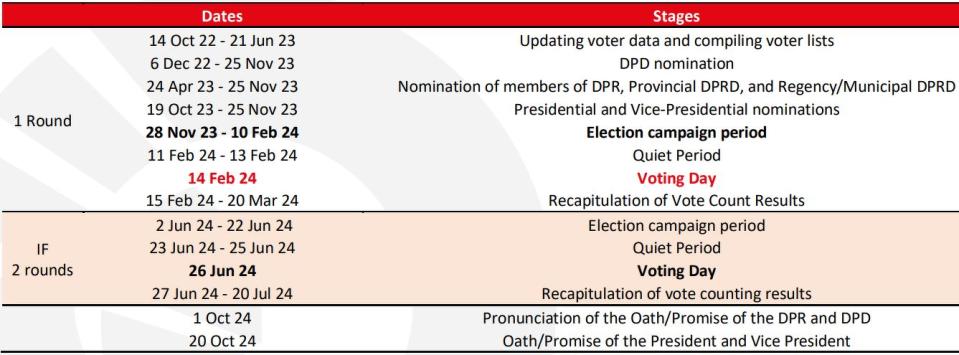
Other simultaneous elections
The Presidential elections have garnered most of the headlines, but these are simultaneous elections for Indonesia’s House of Representatives and local government representatives.
The elections for the House of Representatives, crucial in approving legislation, are also important for economic reform prospects, say Venkateswaran and Enver.
According to the analysts, the Indonesian Democratic Party of Struggle, or Partai Demokrasi Indonesia Perjuangan (PDI-P), currently holds the largest number of seats in the Lower House (128 out of 575 seats) followed by Golkar (85) and Gerindra (78). The latter is Prabowo Subianto’s party.
While President Jokowi had the support of the legislature in the second term, he consolidated his position by bringing in his opposition, including Prabowo Subianto, into the government.
With President Jokowi’s implicit defection from the PDI-P towards Prabowo’s Gerindra, the composition of the House of Representatives may change significantly, say the analysts. “It will be crucial to understand if the incoming President has a strong influence in the Parliamentary process. To that end, the composition of the Lower House, the political coalitions and alliances that follow the Feb 14 elections will be watched closely.”
How will the markets react?
Ahead of past elections, asset markets have been volatile, says OCBC.
The Jakarta Stock Price equity index, JCI, was weakest 15 days prior to the election and subsequently picked up. Similar trends were observed in 10-year yields, which rose to a high 10 to 12 days prior to the elections.
The 2009 elections were impacted by the Global Financial Crisis, say the analysts, and so, were an anomaly.
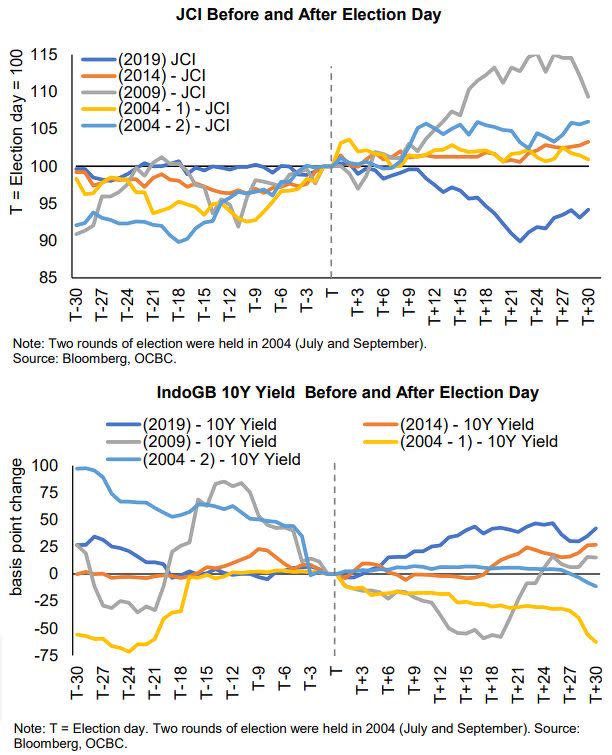
This time, the volatility has been not only due to the political cycle but also moves in US Treasury yields and concomitant adjustments to US Federal Reserve rate cut expectations, they add.
The 10-year Indonesia Government Bond (GB) yield moderated to a low of 6.521% on Feb 2 before rising to 6.600%, as of Feb 7.
During past election cycles, the currency exchange rate versus the US dollar was also at its weakest around the same period 10 to 12 days prior to the elections.
Ahead of this round, the US dollar and Indonesian rupiah pair has been volatile. “IDR depreciation pressures, external factors notwithstanding, were exacerbated on certain days by rumours of Finance Minister Sri Mulyani Indrawati’s resignation,” note the analysts.
“The pair has, however, recently moved lower on expectations of a first-round win,” they add.
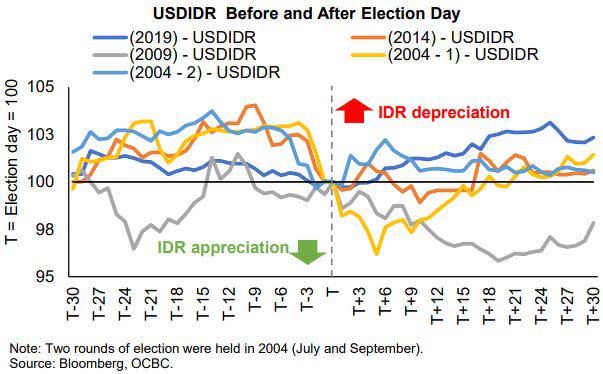
No clear candidate for policy continuity
Investors are looking for a sense of broader policy continuity from the next Presidential candidate, say Venkateswaran and Enver.
Incumbent President Jokowi has adopted numerous longer-term development priorities that the incoming chief must follow through in order to yield “substantive results”, they add. “These include down-streaming in the mineral and resources sectors, shifting the national capital to Nusantara from Jakarta by 2045 and a continued focus on infrastructure spending.
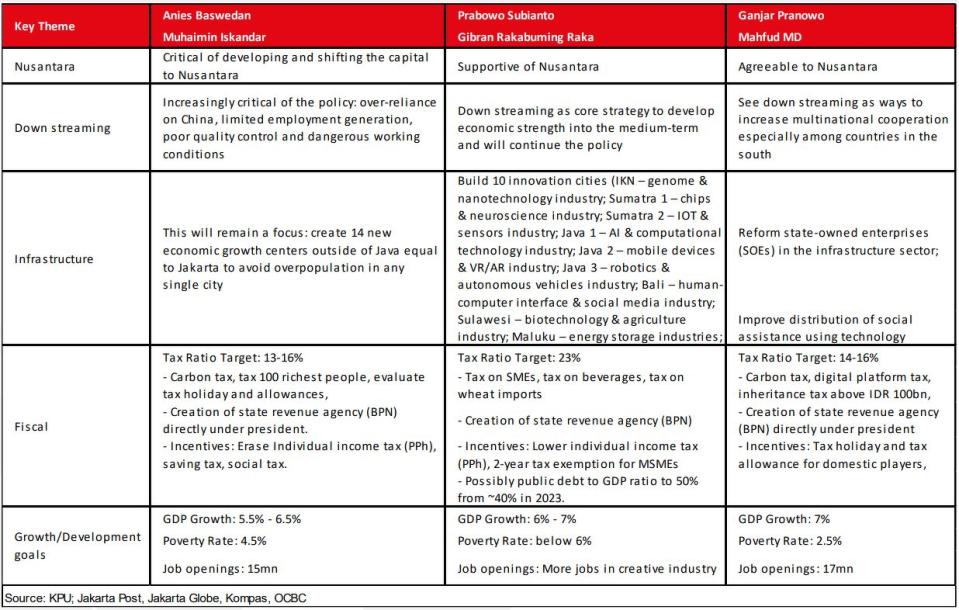
However, there is “no clear candidate for policy continuity”, say the analysts. But based on recent rhetoric, candidates Prabowo and Ganjar are most likely to continue some of President Jokowi’s flagship policies.
“That said, Ganjar highlighted at the final Presidential debate on Feb 4 that he will relook the labour provisions of the Omnibus Law, a key piece of legislation from the Jokowi administration, suggesting an increasingly critical outlook for President Jokowi.”
Anies Baswedan will differ the most from President Jokowi. He has publicly criticised President Jokowi’s down-streaming policies and the shift of the national capital to Nusantara.
From a market standpoint, a Prabowo victory in the first round along with a strong mandate for the Lower House will be treated as a positive outcome, according to OCBC.
On the flipside, a second-round run-off between Prabowo and Anies and no clear party strongholds for the Lower House will be a worse outcome, they add.
Notwithstanding the initial market reaction, the cabinet appointments for key economic posts such as Finance Minister and Coordinating Minister for Economic Affairs will be watched closely and crucial for policy continuity, say the analysts.
“Technocratic appointments to these posts will allow for greater investor confidence.”
Infographics: OCBC Global Markets Research
See Also:
Click here to stay updated with the Latest Business & Investment News in Singapore
OCBC issued over $7 bil in sustainable financing to region's SMEs last year, more than double y-o-y
Get in-depth insights from our expert contributors, and dive into financial and economic trends

 Yahoo Finance
Yahoo Finance 